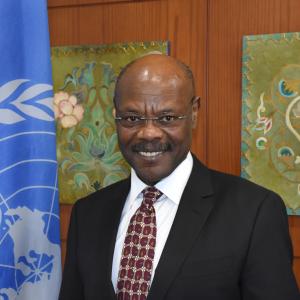Joint Statement on United States Lifts Sanctions on Syria by UN Resident and Humanitarian Coordinator for Syria, Adam Abdelmoula, and Regional Humanitarian Coordinator for Syria Crisis, Ramanathan Balakrishnan
15 May 2025
We welcome the recent announcement by President Donald J. Trump regarding the lifting of sanctions imposed by the United States on the Syrian Arab Republic. This decision, upon implementation has the potential to alleviate the protracted suffering of millions of Syrians and to unlock tangible progress in the delivery of humanitarian assistance and the advancement of early recovery efforts.
For years, sanctions have constrained and complicated delivery of humanitarian response and kick-starting early recovery operations. The lifting of these restrictions is expected to enable broader access to life-saving assistance, facilitate the rehabilitation of critical infrastructure, and create an environment that supports responsible investment in basic services and livelihoods.
It is imperative that this development translates into concrete improvements in the lives of the people of Syria. The United Nations calls for sustained efforts to ensure that the benefits of sanctions relief are felt equitably and directly by affected communities across the country.
The United Nations remains steadfast in its commitment to supporting the people of Syria through principled humanitarian action and inclusive recovery efforts, in close coordination with all stakeholders. We urge the international community to seize this opportunity to scale up funding for Syrian humanitarian response and for Syria’s recovery in a manner that is timely, predictable, and responsive to evolving needs.
The lifting of sanctions offers a renewed opportunity to help Syrians rebuild their lives in safety and dignity, and to advance toward the peace, stability, and future they rightfully deserve. The United Nations stands ready to work with all partners to ensure that this moment serves as a catalyst for long-term stability, resilience, and peace.

Prior to his appointment as United Nations Resident Coordinator, he was serving as Deputy Special Representative of the Secretary-General, Resident Coordinator and Humanitarian Coordinator for Somalia, where he led the UN’s development and humanitarian activities amid the worst drought in generations, political instability, disease outbreaks and a looming famine.
Prior to this, Mr. Abdelmoula held different positions within the UN System, including as Director of the UN Human Rights Council and Treaty Mechanisms Division at the Office of the High Commissioner for Human Rights (OHCHR); Country Director for Iraq at the UN Development Programme (UNDP); Resident Coordinator and Resident Representative in Syria and Kuwait, Chief of Middle East and North Africa (MENA) Section at OHCHR, Deputy Chief of the United Nations Mission in Liberia Human Rights Division, Chief Human Rights Officer of the United Nation Assistant Mission for Iraq and Senior Rule of Law and Human Rights Adviser for Somalia.
Before joining the UN, Mr. Abdelmoula worked for several international and regional organizations including Human Rights Watch, Lawyers Committee for Human Rights, the Arab Lawyers Union and the Fund for Peace.
Mr. Abdelmoula has a doctorate in public international law from Georgetown University, a Master of Law from Harvard Law School and Bachelor of Law from Khartoum University.

